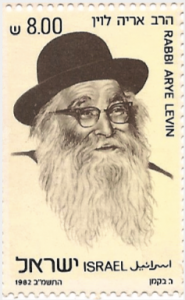When I First Met My Grandfather
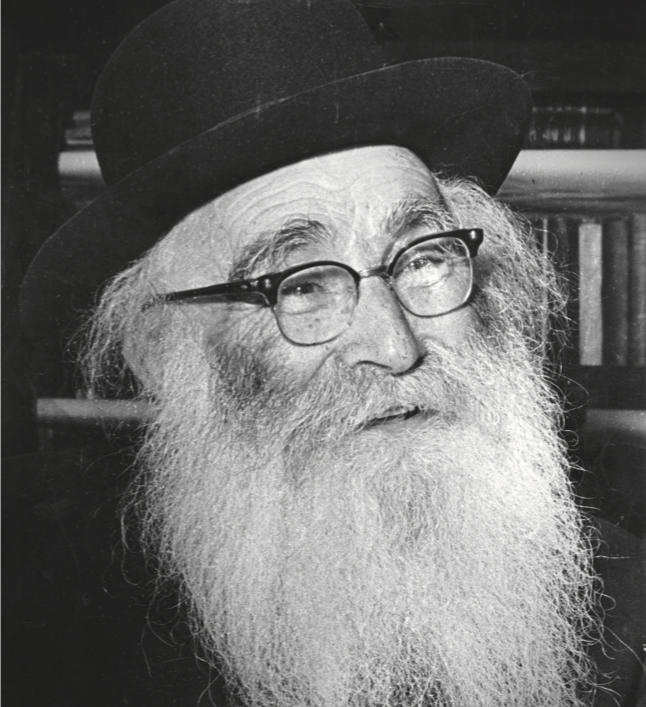
Rabbi Aryeh Levin, 1885-1969. Photos are courtesy of Rabbi Benji Levene, unless otherwise indicated.
Rabbi Benji Levene recalls the “Tzaddik of Jerusalem,” Rabbi Aryeh Levin, whose 50th yahrtzeit is commemorated on the ninth of Nisan this year.
I first came on a visit to Israel in 1960, when I was thirteen. My older brothers came too, and they rented a room, but I was to stay alone with my grandfather, Reb Aryeh Levin z”l, in his home in the Nachlaot section of Jerusalem. This was an enormous privilege because when any of my Israeli cousins would visit him, they would then naturally go home. But I actually lived with him for that summer and even for a few more summers in subsequent years; it was a fascinating experience that helped chart the rest of my life.
I had never previously met my grandfather. I grew up in Jersey City, New Jersey, where my father, Rabbi Chaim Yaakov Levene, z”l, was the rabbi of a large congregation. In 1939, recognizing my father as one of the most brilliant talmidei chachamim in Jerusalem, Rabbi Meir Bar-Ilan (Berlin), president of the Mizrachi movement, had sent my father to visit several US cities to give shiurim. The outbreak of World War II delayed his return, a delay which eventually stretched for thirty years.
Naturally, I had heard a lot about Reb Aryeh, not only from my father but also from the stream of distinguished visitors from Israel—Menachem Begin, for example—who would often stop by our home to spend time reminiscing with my father and to seek his counsel on the issues of the day.
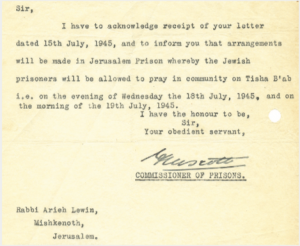
A letter to Reb Aryeh from the British Commissioner of Prisons; Reb Aryeh was constantly working to improve conditions—both physical and spiritual—for Jewish prisoners during the British Mandate.
Reb Aryeh was known as the “Tzaddik of Jerusalem,” but he was also called the “Father of the Prisoners” during the British Mandate. The prison in the Russian Compound in Jerusalem, today a museum, held many members of the Jewish underground—the Haganah, the Irgun, and the Lehi—who stood accused or who had been found guilty of political or criminal offenses against the British army. His selfless acts of kindness to these prisoners made him a living legend. Every Shabbat and yom tov morning, regardless of heat or cold, he would walk to the prison to daven with them. Each one of the inmates, whether religious, secular or even anti-religious, looked forward to feeling the warmth of the handshake of this little rabbi with the long black coat and the long white beard who brought them such encouragement and showed them such compassion. From the prison he would hurry to the families of various prisoners to bring them news of their loved ones.
When I arrived at his home, my grandfather stood up, made a Birkat Shehecheyanu, and gave me a hug. With a smile, he looked at my elder brothers and, playing on my name Binyamin, he quoted Yosef when he first saw Binyamin in Egypt, “Is this your young brother whom you told me about?” Then he added the berachah that Yosef gave Binyamin, “May God be gracious to you, my son.” That berachah has accompanied me all my life, and I really believe that a lot of the success in my life came from that berachah of chen.
Reb Aryeh lived alone in one small room, into which he had moved when my grandmother passed away many years before. Two of my aunts lived close by in the same courtyard and kept an eye on him. I was struck by the simplicity of his room, as he owned very little and lived extremely modestly. In the center was a small table covered with an oilcloth, with a few rickety chairs alongside it. There was a bed on each side of the room, as well as two old bookcases with his sefarim, and a wooden closet which held his frockcoat and shirt. On the window sill was a tin box, probably once used for crackers or cookies, in which he kept his shtreimel. Finally, there was a battered green painted desk with drawers containing paper, bottles of ink and dip pens, at which he would write notes in his very compact, very beautiful handwriting. At the back of the room was a tiny alcove that served as a kitchen, and an even tinier bathroom.
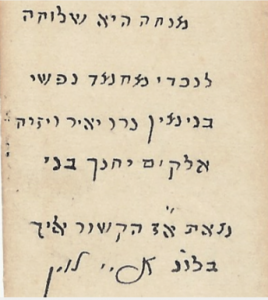
Reb Aryeh wrote out the berachah he gave his grandson Benji upon first meeting him, “May God be gracious to you, my son.” (Image enlarged.)
We settled into a daily routine. Without waking me, my grandfather would get up very early in the morning to daven at the vatikin minyan in the Zohorei Chamah shul on Rechov Yafo, across from the Machaneh Yehudah market. After he returned, he woke me around 8:00 am saying, “Binyominke, what time do they daven in your father’s shul in New Jersey?” And when I answered that there was a minyan as late as eight o’clock, he would say, “If you run now, you can still make it.”
When I came back from shul, he cooked my breakfast. I would go up to my aunt’s apartment to get an egg, and then he would fry it with olive oil on a finicky kerosene primus stove, in an ancient pan that I imagined had been used in the Beit Hamikdash. After breakfast we learned together. For decades he had been the mashgiach ruchani at Jerusalem’s venerable Etz Chaim Yeshiva and he had an extraordinary talent for engaging youngsters. The memory I savor most of that whole summer is of those hours when he learned with me, with such a pleasant approach and a wonderful sense of humor.
After we finished learning, he would often suggest that I go over to Hechal Shlomo, which was then the seat of the Israel Chief Rabbinate, and wait for his son-in-law, my uncle Rav Yosef Shalom Elyashiv z”l, and walk him home. In contrast with his later status as head of the Lithuanian (non-Chassidic) Chareidi community, my uncle was then the leading dayan (judge) in the Israeli religious court system. I spent several wonderful Shabbatot with Rav Elyashiv and his wife, my aunt Chaya, with divrei Torah, zemirot and small talk about Jewish life in America.
‘I’m a very short person; I can’t see what’s on top of your head. But I see what’s in your heart.’
When I came as a teenager to stay with my grandfather, I told myself that this was an opportunity for me to observe how a tzaddik conducts himself, and that I would copy his habits and make myself into a tzaddik like him. So I diligently watched what he did, but I found there was nothing to copy, because everything was so normal. His daily life and his habits were governed by common sense, his davening was quiet and straightforward, his conversation was spontaneous and relaxed, and he even chuckled at my jokes.
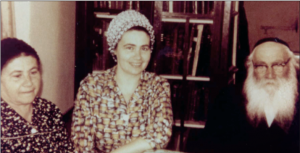
Reb Aryeh with two of his daughters, Rabbanit Shifra Jakobovitz (left) and Rabbanit Etel Plachinsky (center).
My father had once sent him a View-Master with a disc of color photos of animals from Africa. Early one morning, as I still lay in bed, I saw that he had taken it from his closet and, like a little boy, was excitedly staring at the pictures. Fascinated by the lions, tigers and other animals, he kept muttering, “Nifla’os haBorei, nifla’os haBorei [the wonders of Creation]!” Then, after a few minutes he said to himself, “Genug olam hazeh, men darf gein daven’en [enough worldly pleasure, I must go daven].”
One of the things I loved about staying with Reb Aryeh was the extraordinary array of people who came to see him. They would come for a berachah, for advice or just to talk—people from all sectors of Israeli life: men, women, Chareidi, Dati Leumi, chiloni, those who were yearning for children, or who had children who were not yet married or children who were sick, or who were suffering themselves. The links he had made with former members of the underground were very strong, and many of them often dropped by to feel the warmth of his hand and to receive his berachah.
One day two Chassidim knocked at the door to tell him the Gerer Rebbe was on his way, and then they stood guard while Reb Aryeh and the Rebbe spoke. Sometimes the Nobel laureate novelist Shmuel Yosef Agnon would come in. The Knesset was then located not far away on King George Street, and Begin and other Knesset members would often stop by. Some visitors came from chutz la’Aretz. My grandfather did not know much English, so he and I spoke in Yiddish, which I had learned from my parents. One time an American came in who spoke only English, and so I served as the interpreter. Usually my grandfather would insist on accompanying his guests along the way when they left, but this time he was in a little pain so he asked me to walk the visitor out. Innocently making conversation, I asked the man what he did for a living. “Oh,” he said, “I’m the publisher of the New York Times.” Why did Arthur Hays Sulzberger, a Reform Jew, want to visit the Tzaddik of Yerushalayim? He had heard what a fascinating individual he was, and came to see for himself.
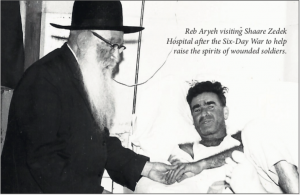 It was his outstanding middot that made Reb Aryeh so famous. He had an amazing instinct—you might almost call it “street smarts”—in dealing with people. Walking with him through the streets of Jerusalem was an adventure in and of itself, as everyone knew who he was and saw in him the way they thought a rav ought to be. No one was ever able to greet him before he said hello to them, and he would stop to chat with each orphan or widow whom he recognized.
It was his outstanding middot that made Reb Aryeh so famous. He had an amazing instinct—you might almost call it “street smarts”—in dealing with people. Walking with him through the streets of Jerusalem was an adventure in and of itself, as everyone knew who he was and saw in him the way they thought a rav ought to be. No one was ever able to greet him before he said hello to them, and he would stop to chat with each orphan or widow whom he recognized.
An eyewitness told me a story that perfectly illustrates how my grandfather was always on the lookout for any mitzvah he could do. Walking one day past the old Shaare Zedek Hospital building on Rechov Yafo, he noticed an attendant wheeling a body out of the cheder taharah, where the deceased were prepared for burial. Ascertaining from the attendant that the deceased was a woman and that she had no relatives to accompany her to her final resting place, Reb Aryeh began giving a hesped on the spot for this woman he did not know. Recognizing him, people stopped to listen, and a large crowd gathered. When he finished, he encouraged the crowd to fulfill the mitzvah of halvayat hamet (accompanying the dead). In her lifetime, would this woman ever have imagined that she would merit a funeral oration from the Tzaddik of Jerusalem, or that such a large crowd would attend her burial? But this was typical of Reb Aryeh, walking the streets of Jerusalem and looking to see where he could do mitzvot.
Someone else once told me that as a young man, he decided to rebel and gave up wearing a kippah. One day he saw my grandfather walking towards him and, remembering that Reb Aryeh was at his brit and his bar mitzvah, he tried to sneak away down a side street so the Rav shouldn’t see him bareheaded. But he was too slow and my grandfather came up to him. “Tell me,” he said, “did I ever do anything to hurt you? Because I noticed you trying to avoid me.” Of course, the young man admitted that he didn’t want Reb Aryeh to see him without a kippah. “Your grandfather took my hands in his,” he told me, “and said, ‘I’m a very short person; I can’t see what’s on top of your head. But I see what’s in your heart.’ Everyone else was telling me that I was a disgrace, that I was embarrassing my family. But Reb Aryeh never said anything negative. It was the sweet and sincere words of your grandfather that convinced me to put the kippah back on my head.”
It is stories like this that illustrate what made him so special. The former Israeli politician Geulah Cohen, who in pre-State Palestine had been a member of the Irgun and then the Lehi, was arrested by the British in 1946 and sent to the women’s prison in Bethlehem. Hearing that some Jewish women were imprisoned there, my grandfather started visiting them, just as he regularly visited the male prisoners in Jerusalem. Years later, Cohen told me that when Reb Aryeh came, “in his presence we all wanted to be better people.” That, to me, is a wonderful definition of a tzaddik, and characterizes my grandfather beautifully. I may not have understood all the things he taught me, but in his presence I wanted to be a better person.
David Olivestone is a member of the Jewish Action Editorial Committee.
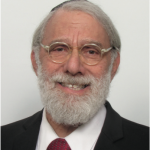 A Yeshiva University graduate, Rabbi Benji Levene, grandson of Rabbi Aryeh Levin, received rabbinical ordination from Israel’s Chief Rabbinate. After serving as advisor to the chairman of the Aliya Department in the Jewish Agency for Israel, he served as educational director of the Gesher organization, which is dedicated to bridging the gap between religious and secular Jews. Rabbi Levene, who often serves as a scholar-in-residence in many Diaspora communities, was installed in 2014 as the rabbi of the Achdut Yisrael synagogue in Jerusalem, which was his grandfather’s synagogue.
A Yeshiva University graduate, Rabbi Benji Levene, grandson of Rabbi Aryeh Levin, received rabbinical ordination from Israel’s Chief Rabbinate. After serving as advisor to the chairman of the Aliya Department in the Jewish Agency for Israel, he served as educational director of the Gesher organization, which is dedicated to bridging the gap between religious and secular Jews. Rabbi Levene, who often serves as a scholar-in-residence in many Diaspora communities, was installed in 2014 as the rabbi of the Achdut Yisrael synagogue in Jerusalem, which was his grandfather’s synagogue.

